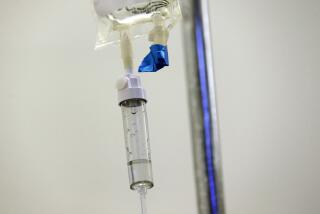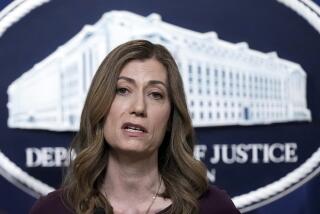FDA to Lift OK of Last Dyazide Generic Version
- Share via
WASHINGTON — The Food and Drug Administration, escalating its campaign against generic drugs that it believes have been marketed improperly, announced Monday that it will withdraw approval of the last remaining generic equivalent of Dyazide, a leading blood pressure drug.
The FDA said it could no longer be certain that Bolar Pharmaceutical’s generic drug, one of the nation’s best-selling generics, is precisely equivalent to Dyazide. A review of its records, the FDA said, uncovered an apparently inadvertent mix-up at the time the less-expensive generic drug received its initial approval two years ago.
No ‘Proved Equivalence’
The FDA “does not consider the generic to be of proved therapeutic equivalence to the brand-name drug Dyazide,” the agency said in a statement.
FDA spokesman Jeff Nesbit emphasized that the agency had no evidence that the drug was not safe and effective. The agency urged patients now taking the drug to check with their physicians before switching medication.
Bolar, responding sharply to the FDA’s action, said it will appeal the decision to withdraw approval for its drug, which will be available during the appeal process.
“The Bolar product remains on the market,” the company said. “It is safe, effective and may be used with assurance of clinical effectiveness.”
The withdrawal of Bolar’s generic drug would leave the market with no low-cost generic equivalent to Dyazide, which is made by Smithkline Beckman. Vitarine Pharmaceuticals Inc. halted distribution of its version earlier this summer after admitting that it had substituted samples of the brand-name drug for its own to win FDA approval.
But Mylan Laboratories makes a similar blood-pressure drug called Maxzide, and many generic equivalents of Maxzide are available.
At Request of Dingell
The FDA, explaining its intention to withdraw its approval of Bolar’s generic to Dyazide, said it reviewed the drug’s original approval at the request of House Energy and Commerce Committee Chairman John D. Dingell (D-Mich.).
Nesbit said the agency discovered that the firm hired by Bolar to conduct the testing process checked two similar batches of drugs for equivalency with Dyazide. One proved to be identical to the brand-name drug, Nesbit said, and the other did not.
But when Bolar submitted data on the drug it planned to market, Nesbit said, it submitted the lot number of the batch of the chemical that had proved somewhat different from Dyazide.
Bolar insisted Monday that a typist accidentally switched the numbers and that the drug now sold as the generic--capsules of hydrochlothiazide and triamterene--is actually identical to Dyazide.
The FDA did not dispute that the mix-up was accidental. But it said the motive did not matter.
Raises Safety Issue
“The agency has no certainty as to which of those lots was really used,” Nesbit said. “The agency has to have a high degree of safety in the approval process that the drug is bioequivalent, and it clearly does not have that in this case.”
If Bolar fails in its appeal to keep FDA approval of the drug, it would be forced to return to the testing process and submit new data on the drug’s equivalency to Dyazide in order to re-enter the market.
People taking the Bolar generic would either have had it prescribed specifically by their physician, or a pharmacist might have substituted the lower-cost Bolar generic for a prescription of Dyazide.
The Bolar generic is one of 30 of the most commonly used generic drugs that the FDA announced Aug. 16 it was testing to make sure they were safe and effective. That announcement followed disclosures that testing data for some generics had been falsified to gain the FDA’s approval.
“Our off-the-shelf testing has shown that the drug (Bolar’s generic to Dyazide) is safe and effective,” Nesbit said. “What is at question here is what passed and what failed in the approval process.”
As a result of its testing of the 30 generic drugs, the FDA is seeking to permanently remove from the market more than two dozen drugs made by Par Pharmaceuticals of Spring Valley, N.Y., and Vitarine Pharmaceuticals of Springfield, N.Y. These drugs have already been voluntarily recalled by the companies.
Par officials have admitted bribing chemists in the FDA’s generics division to gain speedy approval for its drugs, and Vitarine admitted that it defrauded the government by submitting false safety test data about its products.
Par produces three of the drugs the FDA is seeking to permanently remove. These are orphengesic, a muscle relaxant; orphengesic forte, a stronger version of the same drug, and hydrochlorothiazide and triamterene tablets, a combination blood-pressure drug.
Vitarine produces 25 drugs the FDA is attempting to remove, including antibiotics as well as the generic version of Dyazide.
More to Read
Sign up for Essential California
The most important California stories and recommendations in your inbox every morning.
You may occasionally receive promotional content from the Los Angeles Times.













